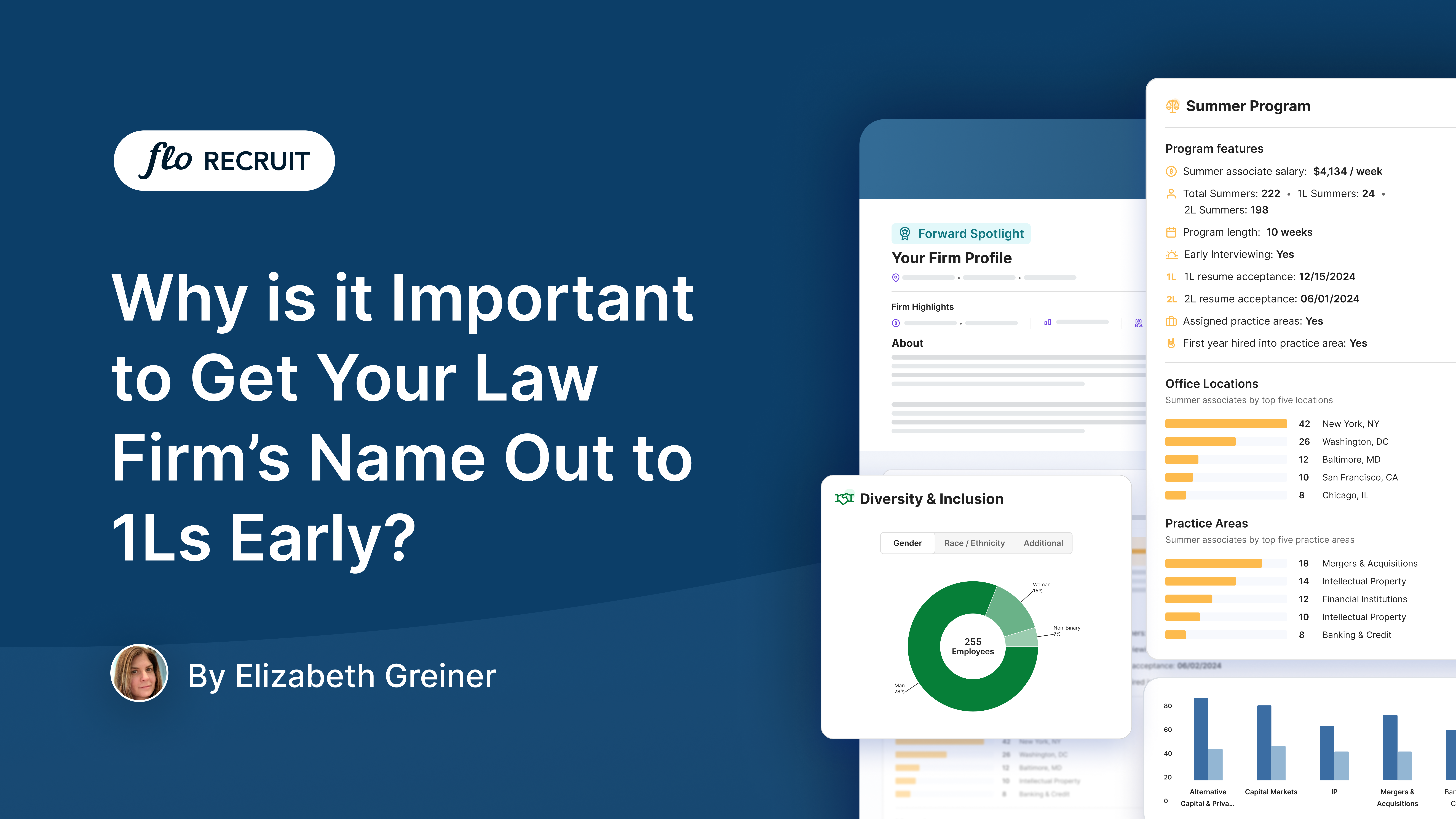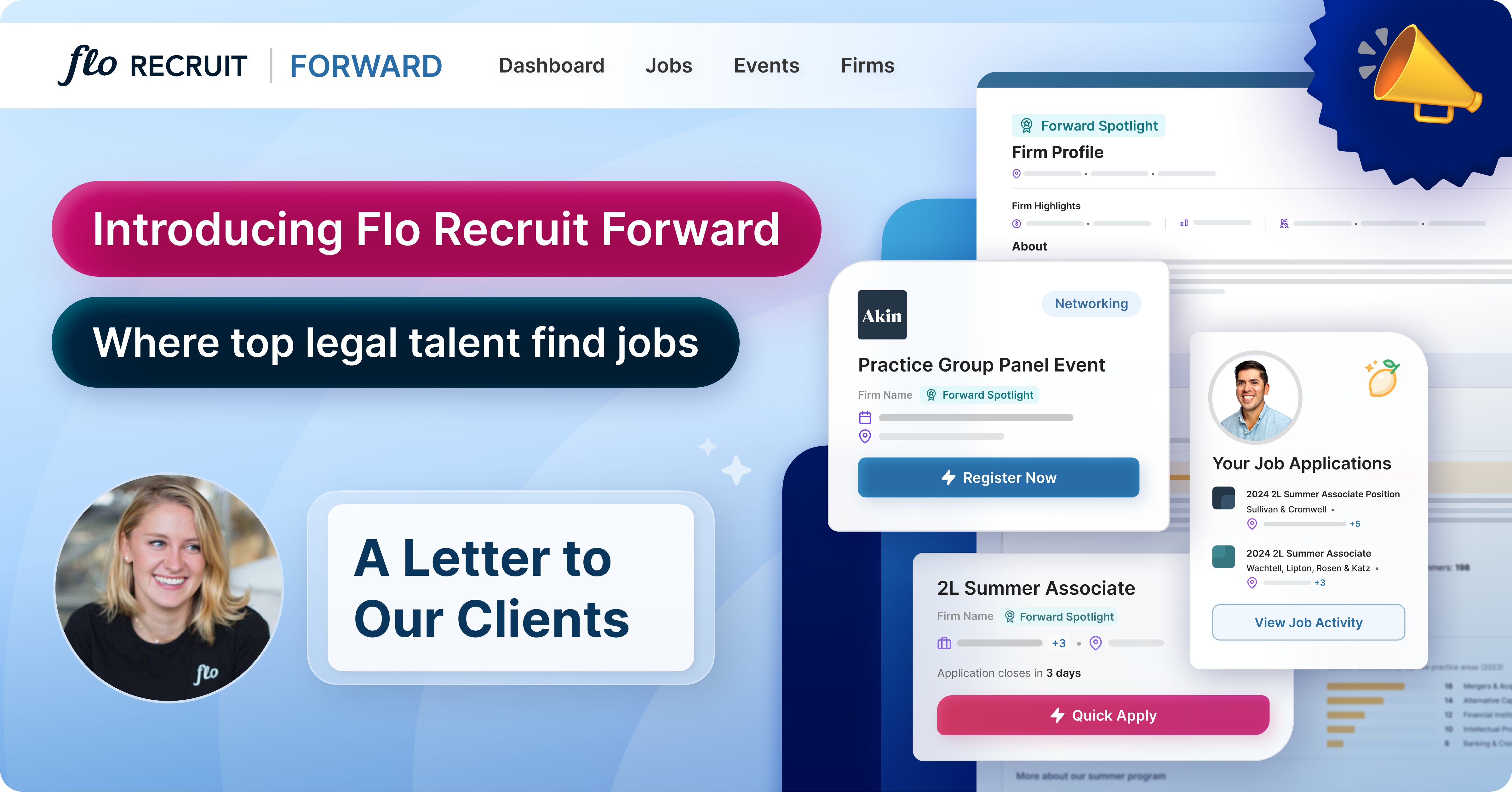What Do 1Ls Most Want to Know About Their Future Firm?
As law firms look to recruit the best and brightest students from top law schools, understanding what law students care about is crucial for building meaningful connections. For 1Ls entering the recruitment process, choosing the right law firm can feel like stepping into the unknown.
To stand out in a competitive market, firms must recognize the questions that are top of mind to these future associates. Forward acts as a central place for firms to provide transparency and for students to find the answers to their most important questions.
This overview of top concerns and inquiries that law students have is based on conversations with students about what firms need to convey to position themselves as the most desirable employers.
1. Billable Hours and Bonus Eligibility
For many law students, the billable hours expectations at a firm is a critical factor in deciding where to start their careers. While all firms require associates to bill hours, students want to know the firm’s specific expectations. Will the hours required make maintaining a work-life balance difficult? Is there flexibility in how and when those hours are billed? Does pro bono work and/or travel count towards billable hours?
Students also care about the firm’s bonus structure—are bonuses tied strictly to hours, or are there other performance-based incentives? Making all these policies clear and transparent is crucial to law students.
2. Mentorship and Training: Buzzwords or Reality?
Mentorship is frequently cited as a key benefit of joining a firm, but students are eager to know whether these mentorship programs actually work. How structured is the mentorship? Are there opportunities for ongoing, one-on-one guidance from seasoned attorneys? 1Ls want assurance that they will receive the training needed to thrive, not just be left to fend for themselves in a high-stakes environment.
Firms that emphasize meaningful mentorship and training opportunities are more likely to stand out to students looking for professional development. These are also the students who are more likely to do well at the firm, as they are seeking a place to thrive and grow. Transparency about the firm's mentorship process can set firms apart from competitors. Students want to know whether it is formal or more informal, how often mentors meet with mentees, and the resources available for ongoing learning, as well as the process for assigning mentors.
3. How Do You Really Make Partner?
The partnership track is a mystery to most law students, and many want the process demystified before they commit to a firm. They are curious to know: What does it really take to make partner at the firm? How long does the process typically take? Is the pathway to partnership transparent and equitable, or is it based on factors that aren’t clearly communicated?
Students want to know if partnership is even a realistic goal for them, and what steps they can take early in their careers to increase their chances. Being open about this process can set a firm apart from others who maintain a veil of secrecy around partnership.
4. Attrition Rates: What’s the Reality?
One of the more uncomfortable areas of questions law students have is around attrition rates. How many associates actually stay past a few years at the firm? Is this by design or are associates leaving who the firm would prefer to stay? What are the most common reasons associates leave?
Transparency about attrition rates and what the firm is doing to retain talent is crucial for students who want to make informed decisions. If high attrition rates are a reality, students will want to know how the firm is addressing this issue.
5. Pro Bono Work: Is It Important and How Are the Hours Counted?
For many students, especially those with a strong commitment to public interest law, a firm’s stance on pro bono work can be a dealbreaker. They want to know whether pro bono work is genuinely encouraged or whether it is just there to just check a box. Is there a cap on the number of pro bono hours that can count toward billable requirements? Are associates penalized for focusing on pro bono work instead of billable cases?
Firms that are serious about fostering a culture of service and social responsibility should be transparent about their policies.
6. Diversity and Inclusion Efforts
Diversity and inclusion remain central concerns for 1Ls. Students want to know how diverse the firm really is—not just in terms of numbers but in terms of leadership and opportunities for advancement. Is the firm actively working to improve diversity, and if so, what steps are being taken? Are there affinity groups or support networks available for underrepresented attorneys?
Firms that are serious about addressing diversity and inclusion should highlight the concrete initiatives they have in place to foster a more equitable workplace. They should also make sure their goals are transparent and readily available for students to see.
7. What Kind of Work Do Junior Associates Actually Get?
One major concern for students is the type of work they’ll be doing as junior associates. Will they be tasked with meaningful work and given responsibility, or will they spend most of their time doing administrative tasks like doc review? Students also want to know what the hierarchy is like. Will they work directly with partners, or will most of their interactions be with associates?
Firms that offer junior associates the chance to work closely with partners and gain hands-on experience are more attractive to students who want to grow quickly.
8. Are There Enough Offers for Every Summer Associate?
When students commit to a summer associate position, they want to know whether that commitment will lead to a full-time offer. The anxiety surrounding post-summer offers is real, and transparency around offer rates can alleviate some of that stress.
Firms should be clear about how many summer associates typically receive offers and what factors contribute to those decisions. Students want to know whether there is an offer for every summer, assuming their work and behavior show the firm they have earned the offer.
9. Remote Work Policy and Face Time Expectations
In today’s world, the ability to work remotely is a high priority for many law students. Students want to know whether they’ll need to be in the office every day or if a hybrid or fully remote option is available.
They also want clarity around the firm’s expectations for "face time"—is there an unspoken expectation to be physically present, even if remote work is allowed? Many firms leave these kinds of policies unsaid, so being direct is key here.
10. Career Coaching and Development Opportunities
Career coaching is another area where students seek clarity. They want to know whether the firm provides resources to help them develop their careers, both within and outside the firm. Is there a career coach available, and what kind of support do they offer? Are there resources for associates who may eventually want to transition out of the firm into other legal or business roles?
Career development programs are a major selling point for students who want to feel supported in both the short and long term. They also want to know if they can speak to these coaches confidentially or if their conversations can be conveyed back to their practice groups and/or firm management.
11. Work-life Balance and PTO Policies
Work-life balance is often one of the biggest concerns for 1Ls when evaluating firms. Will they be expected to be on call 24/7, or does the firm encourage some separation between work and personal life? For firms offering unlimited PTO, students want to know whether associates actually take time off, or if there's an unspoken expectation that they should always be available.
Firms that actively promote work-life balance and ensure that associates can truly disconnect when needed will appeal to students who are mindful of burnout.
12. Firm Culture and Collegiality
Last, but certainly not least, law students are very interested in learning about the firm’s culture. Is it a collegial environment where associates support one another, or is it highly competitive? Are partners approachable and invested in the growth of younger attorneys, or do they not make time for mentoring?
Firms with a collaborative, supportive culture often stand out to students who are eager to learn and grow in a positive work environment. This can sometimes be the hardest quality to convey to students. Firms should consider how to use resources like Forward to highlight examples of firm culture. This can really be seen in the firm’s commitment to each area of firm life that students are most interested in - together this can all paint a picture of who the firm really is.

Conclusion
Ultimately, law students are seeking transparency and authenticity in the recruitment process. Firms that address these key concerns openly and honestly are more likely to attract top talent. By using tools such as Forward to make comprehensive and unique profiles highlighting their commitment to mentorship, diversity, career development, and work-life balance, firms can position themselves as ideal places for law students to launch their legal careers.






.png)